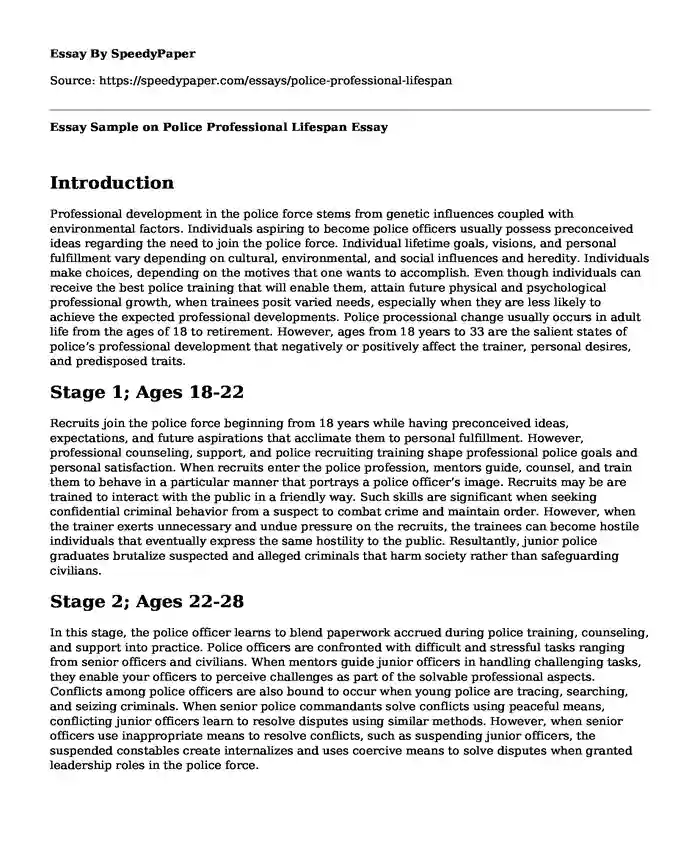
| Type of paper: | Essay |
| Categories: | Law Police Development |
| Pages: | 3 |
| Wordcount: | 665 words |
Introduction
Professional development in the police force stems from genetic influences coupled with environmental factors. Individuals aspiring to become police officers usually possess preconceived ideas regarding the need to join the police force. Individual lifetime goals, visions, and personal fulfillment vary depending on cultural, environmental, and social influences and heredity. Individuals make choices, depending on the motives that one wants to accomplish. Even though individuals can receive the best police training that will enable them, attain future physical and psychological professional growth, when trainees posit varied needs, especially when they are less likely to achieve the expected professional developments. Police processional change usually occurs in adult life from the ages of 18 to retirement. However, ages from 18 years to 33 are the salient states of police’s professional development that negatively or positively affect the trainer, personal desires, and predisposed traits.
Stage 1; Ages 18-22
Recruits join the police force beginning from 18 years while having preconceived ideas, expectations, and future aspirations that acclimate them to personal fulfillment. However, professional counseling, support, and police recruiting training shape professional police goals and personal satisfaction. When recruits enter the police profession, mentors guide, counsel, and train them to behave in a particular manner that portrays a police officer’s image. Recruits may be are trained to interact with the public in a friendly way. Such skills are significant when seeking confidential criminal behavior from a suspect to combat crime and maintain order. However, when the trainer exerts unnecessary and undue pressure on the recruits, the trainees can become hostile individuals that eventually express the same hostility to the public. Resultantly, junior police graduates brutalize suspected and alleged criminals that harm society rather than safeguarding civilians.Stage 2; Ages 22-28
In this stage, the police officer learns to blend paperwork accrued during police training, counseling, and support into practice. Police officers are confronted with difficult and stressful tasks ranging from senior officers and civilians. When mentors guide junior officers in handling challenging tasks, they enable your officers to perceive challenges as part of the solvable professional aspects. Conflicts among police officers are also bound to occur when young police are tracing, searching, and seizing criminals. When senior police commandants solve conflicts using peaceful means, conflicting junior officers learn to resolve disputes using similar methods. However, when senior officers use inappropriate means to resolve conflicts, such as suspending junior officers, the suspended constables create internalizes and uses coercive means to solve disputes when granted leadership roles in the police force.
Stage 3: Ages 22-33
The successful or unsuccessful incorporation of paperwork into practice lands police officers into an independent individual in handling conflicts. The police officers that entered this stage upon solving disputes successfully in the latter stages become aware of numerous means of solving problems alone and making critical decisions when faced with challenging situations that allow them to receive promotions and job satisfaction. However, police officers who failed to solve conflicts in the earlier stages are likely to suffer from stress due to a lack of promotions and inappropriate influences from co-officers regarding the police profession.
Conclusion
Police officers grow professionally depending on heredity and influences from mentors. When mentors provide positive training, counseling, and guidance, police officers attain personal fulfillment that is faceted with professional independence. However, negative training and counseling de-escalate professional growth to junior police officers.
References
Levinson, D. (1986). The Conception of adult development. The American Psychologist, 42 (6), 3-13. https://ils.unc.edu/courses/2020_fall/inls558_001/adultdevelopment.pdf
Levinson, D. (1985). The seasons of a man’s life. Knoph: New York, NY. https://www.google.com/url?sa=t&rct=j&q=&esrc=s&source=web&cd=&cad=rja&uact=8&ved=2ahUKEwit4euz1MHtAhUBGVkFHdhFBi4QFjAAegQIERAC&url=https%3A%2F%2Fjournals.sagepub.com%2Fdoi%2Fabs%2F10.1177%2F105960117900400214&usg=AOvVaw2buiCMwxwyIEBurnlZ3MCw
Burke, R., & Mikkelsen, A. (2006). Police Officers over career stages: Satisfaction and wellbeing. Europe’s Journal of Psychology. Retrieved from: http://www.ejop.org/archives/2006/02/police_officers.html.
Cite this page
Essay Sample on Police Professional Lifespan. (2024, Jan 26). Retrieved from https://speedypaper.com/essays/police-professional-lifespan
Request Removal
If you are the original author of this essay and no longer wish to have it published on the SpeedyPaper website, please click below to request its removal:
- Essay Sample: Trajectories of Criminal Behavior
- Free Essay on Conducting Contract Negotiations
- Essay Example on Child Therapy Case Consultation
- Essay Example on Evidence-Informed Criminal Justice Policy
- Paper Example. Brown v Entertainment Merchants
- Extent Learning a Second Language - Free Essay Example
- Technology: Blessing or Curse? - Essay Sample
Popular categories




